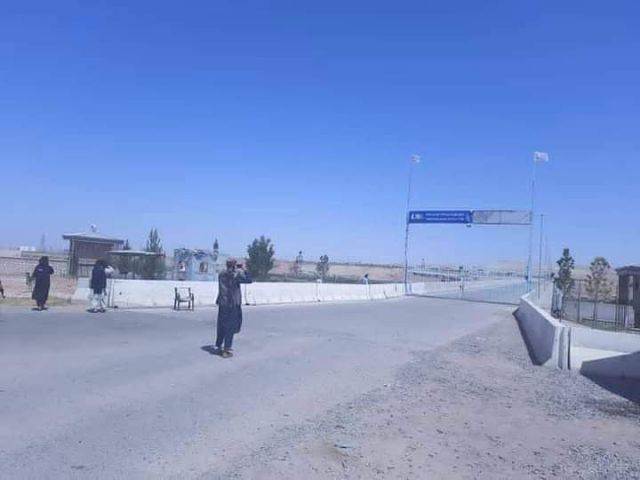The actual transition of Afghanistan under the control of the Taliban movement, whose armed forces have already reached the country’s borders, has led experts to increasingly discuss what awaits post-Soviet Central Asia once this process is completed.
On the one hand, all official statements and rhetoric of the modern Taliban indicate that it is a national movement, albeit based on Islam, not in the ethnic sense of Pashtun nationalism, as is sometimes presented, but in the sense of an all-Afghan state.
Taliban leaders have repeatedly stated that they have no ambitions or goals beyond their borders, and have no intention of encroaching on anyone else’s borders. This is at least logical.
First, because the Taliban themselves have already lost their state once, thousands of lives of their members, and two decades that they could have been in power, not to mention the losses of all of Afghanistan and its people due to their affiliation with al-Qaeda and the 9/11 attacks.
Secondly, because from the perspective of the national interests of the Afghans, which the Taliban claim to represent, it is obvious that Afghanistan, which for four decades has been unable to emerge from the abyss of devastating wars that have deprived it of development prospects, needs a respite and the reconstruction of the country, as well as the creation of conditions for its development.
On the other hand, the Taliban is not a narrowly Pashtun but a pan-Afghan movement, and Afghanistan is a country with compact ethnic groups whose territories are divided by state borders, not to mention Muslims who have sought refuge in its territory from persecution in their own countries. This is known not only to the Taliban, but also to the ideologically hostile regimes on the other side of the border.
Now they are trembling with fear that the Taliban might move north, but at the same time they will do everything in their power to ensure that the Taliban, if not overthrown throughout Afghanistan, cannot control the areas populated by non-Pashtun peoples.
Therefore, the Taliban will have to define their relations with the respective regimes, and it is not excluded that they will decide that it is better to do this immediately in the context of their success in Tajikistan, rather than later, when they will be hindered by their concentration on the tasks of reconstruction and development of the country.
This, by the way, does not contradict their statements. After all, if the Taliban themselves have no claims against the neighboring regimes, it does not mean that these claims do not exist or will not arise among the Muslims who have fled to Afghanistan from these countries… Whether these claims will arise or not, and who will support them, already depends on many factors, the most important of which will be the choice of the Taliban’s geopolitical strategy, that is, first of all, their friends, partners and enemies.
The Americans are leaving Central Asia, but Iran, the Turkic countries oriented towards Turkey, China, Russia and India with their interests will remain around Afghanistan. The Taliban themselves are hardly inclined to confront Uzbekistan and Kyrgyzstan, which are moving closer to Turkey.
The question is what line the latter will choose towards them, whether they will try to interact with them on the Islamic platform or bet on purely Turkic interests to the detriment of them, i.e. support Uzbek and other Turkic separatism in Afghanistan and controversial figures like General Dostum.
Tajikistan, a country friendly to Iran, is not part of Turkey and the immediate interests of the Turkic project, but the ruling regime of Rahmon cannot be considered friendly to Iran either. From this point of view, Rahmon’s regime may be vulnerable to attacks by anti-Rahmon Tajiks from Taliban-controlled Afghanistan. But taking action against them would mean a conflict with Beijing and Moscow, whose clients Rahmon is.
Some analysts believe that this is exactly what the Americans were counting on when they withdrew their troops from Afghanistan. But does this fit in with the Taliban’s own plans, especially given that China is a strategic partner of Pakistan? Obviously, Tajikistan will to a large extent become the litmus test that will allow us to understand what the Taliban-Chinese relations will look like and what role Moscow will play in them.
Finally, Turkmenistan. Of course, a regime like the power of the mad despot Berdimuhamedov should not exist. But at the same time, Turkmenistan, with its gas reserves, is too tempting for interested neighbors to sit back and watch as someone decides its fate and takes it for themselves. Interesting developments can therefore be expected here as well, with the Taliban acting as a catalyst but not the only participant.
In any case, the transition of Afghanistan under the control of such a revolutionary force as the Taliban will undoubtedly lead to the emergence of a new geopolitical reality in the region. But exactly what it will be will become clear later. (In the photo — the flag of the Taliban at the Shar Khan Bandar border bridge between Afghanistan and Tajikistan)* — banned in Russia

